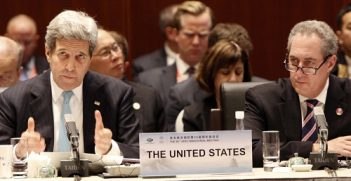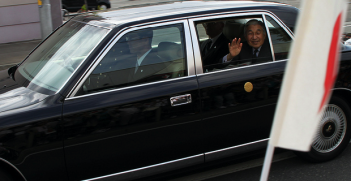The Trudeau Doctrine: Breaking the Mould?

Canadian Prime Minister Justin Trudeau and his Liberal government have set out a path-breaking agenda to portray Canada not as a hard-power-first global competitor but more as a responsibly-acting global citizen. It remains to be seen if the intention translates into workable policies.
Upon the election of Canadian Prime Minister Justin Trudeau and the Liberal government in autumn 2015, many rightly expected a shift to the left from the foreign policy of his Conservative predecessors. However, simply calling this change a liberalisation of Canadian foreign policy does not accurately describe the Trudeau brand. The Trudeau Doctrine embodies the world view of a constructivist; an important nuance that divulges not only how Canada will seek to influence world affairs today but may also preview what Western foreign policymaking could look like under post-baby boomer leadership.
Realists and liberal institutionalists view the international system as one that is inherently anarchic in which states are the sole sources of power. Under such a system, states use hard power to advance their own security and other interests realising relative gains in a zero-sum game (ie for one to gain, the other must lose). These are the most accepted theories for explaining the way states and world leaders interact today.
Constructivists, on the other hand, reject that the international system has an inevitable anarchic structure. Constructivists subscribe to the notion that the structure is in constant evolution. That is, the ethics and identities of states, and how these produce norms and institutions through their interactions, are the drivers of how the international system will ultimately be shaped. As put by core constructivist scholar Alexander Wendt, “anarchy is what states make of it.”
Giving some clout to the explanatory power of constructivism is the foreign policy doctrine rolled out by Canadian Prime Minister Trudeau and Foreign Affairs Minister Stéphane Dion on 29 March 2016. The doctrine, dubbed “responsible conviction”, is guided by a mandate to not only advance Canadian interests but to also “support the deeply held Canadian desire to make a real and valuable contribution to a more peaceful and prosperous world.”
Rather than playing the zero-sum game of purely seeking to maximise Canadian dividends, Trudeau’s mandate is signalling a desire to engage with the international community in a way that constructs the norms and institutions of a positive, inclusive international system. With ethically charged rhetoric, Trudeau has strong convictions on how things “ought to be” and seeks to lead Canada to behave as a responsible actor.
Where the Conservatives distanced themselves from the UN out of frustration of diminishing returns to Canada, the Trudeau Liberals have vowed to re-engage with multilateral institutions in areas such as peacekeeping, conflict prevention and climate change.
From a security perspective, Canada has taken a more humanitarian approach under its new leadership. Much has been made of Trudeau’s target to settle 50,000 Syrian refugees by 2017 and the rationale behind it points to its constructivist motivation. Trudeau emphasises that the country should look less at refugees as suspects fleeing a high-risk terror hotbed and more as future contributors to the prosperity of Canadian communities.
When it comes to Canada’s most important bilateral relationship, that is with the United States, there is wide consensus that the previous government alienated the Obama administration in a largely undiplomatic way by reducing the relationship to a single pipeline project. Trudeau has not only vowed to put this issue on the sideline and focus talks on climate change, border issues and trade facilitation, but has also managed to develop a warm personal relationship with President Obama.
Such policies and rhetoric are painting Canada less as a hard-power-first global competitor and more as a responsibly-acting global citizen. But why take this on? What is driving this fundamental shift?
More than anything, this ideological pivot is a result of generational change. One thing that constructivism does earn credit for is its ability to explain the increasing influence of emerging international phenomena; concerning both institutions and identities. As a rare world leader from generation X, Trudeau recognises and represents an identity shift among his constituents and their views on how international relations should be conducted.
As Canada’s voting bloc gets younger and more internationally connected, the identities of its citizens are becoming less national and more global. Take for example a millennial voter who chats regularly with their friends on Facebook across four continents, sells products to multiple foreign markets from their online business, and has emotional ties to numerous other countries from their studies abroad or a friend who recently immigrated to their neighborhood. Is this voter more likely to resonate with the realist approach of tying foreign policy objectives to zero-sum Canadian gain, or one that takes into consideration how their country’s actions may forge new norms, relationships, and bridge-building institutions among an international community?
In a recent interview on foreign policy with the Huffington Post, Trudeau challenged his internet audience to ask themselves what it means to be a Canadian citizen, or a citizen of any country for that matter. His point was,that in his view nationalistic tendencies often found in ethnically homogenous countries are not consistent with the experience or identity of many Western immigrant-based societies and that an identity shift was taking place. In this sense, Trudeau’s constructivist foreign policy approach could potentially be transformational; a tipping point from a national to a global foreign policy. Trudeau sees his job not only as Canada’s leader but as a world leader.
As population centres shift from baby boomers to generation X, Y, and to millennials, majority voting blocs reflect different world experiences than those that have dominated western politics for decades. Young voters identify with the more human side of international relations, beyond the mere tribal power games explained by realism or liberal institutionalism. Younger generations in Canada resonate with globally conscious policies, as evidenced by those who supported Trudeau’s rise to power in Canada and by its reaction internationally.
These identity shifts, now manifesting in mainstream foreign policy, are best explained when looking through a constructivist lens. Young people are looking to shape the world and tackle big issues. The jury is still out on whether the Trudeau government’s constructivist rhetoric will translate into meaningful policy, and further yet, whether or not it will be effective for Canada and the world.
Could shifting away from a hard-power approach leave Canada vulnerable or decrease its leverage on the international stage? Or if successful, could this government signal a new age of foreign policy thinking among future generations of Western leadership?
Matthew Jerke holds a Master of International Relations from the University of Melbourne. This article is published under a Creative Commons Licence and may be republished with attribution.





